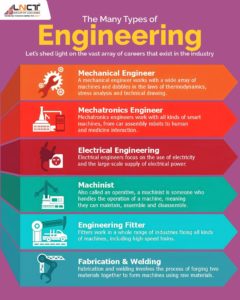Index
-
Introduction
-
Difference between department and specialisation in engineering.
-
How to choose the best engineering department and specialisation?
-
Various engineering departments and specialisations
-
Summary
How to choose the best engineering department and specialisation?
Engineering is not just a stream or subject you choose after school; it has become a life or lifestyle choice. The hard way. Why? Because engineering is a complex subject, it requires students to grasp difficult topics well. Now these topics or issues are more than two to three, seven to nine topics in their syllabus in college.
After deciding on becoming an engineer comes the department to choose, now; here’s a good thing, there are so many different departments to choose from. The student has a wide variety to opt from according to his/her interests.
Difference between department and specialisation in Engineering: Key to choosing the best engineering department!
Department
A department refers to an organizational unit involving more than just one discipline or area of study within the field of engineering in a college or university.
Different departments may exist, e.g. mechanical engineering, electrical engineering, civil engineering, computer science and technology etc.
Each department shall generally provide the faculty, equipment and resources devoted to teaching and research in their respective areas.
In a particular department, students typically receive an engineering degree.
Specialization:
On the contrary, specialization relates to a particular area or subfield within one department. In a broader field, it is characterized by a narrower focus on research and expertise.
For example, a candidate/student may specialize in any field like structural engineering, environmental engineering, transportation engineering, geotechnical engineering and so on as part of the civil engineering department where his main field is civil engineering but the specialisation is “XYZ”
These specialisations enable students to tailor their education so that they are in tune with their interests and career goals. They’ll be able to choose from various compulsory courses and projects that fit their specific area of interest.
How to choose the right engineering department and specialisation?
What your career is going to be is decided by which engineering course you choose. Thus, in order to ensure that you choose the most suitable area for yourself, the utmost caution should be exercised through thorough research.
-
Know your department
Knowing in and out of the department is crucial to choosing the right stream for you. Research & Know the stream, be aware of what it has to offer you, what it will look like five to ten years down the line and if you will still be having enough opportunities or if the scope or statistics seem to be in your favour.
Understand the curriculum structure, practical applications of knowledge gained and industry relevance for courses in this area. Find out about the opportunity to interact with students and alumni who have pursued similar courses of study.
-
Obtain knowledge and guidance.
Contact your lecturers, subject-matter specialists, or career counsellors to learn more about the several specializations available.
Attending job fairs, seminars, or workshops can help you gain more knowledge about a certain industry and establish contacts with the individuals working there. Participate in a discussion and ask questions to learn more about the requirements and opportunities of specialisation and its growth prospects.
-
Determine your needs.
When selecting a course to study in the engineering field, you may find it helpful to consider your professional objectives and needs. For example, you might decide on the type of business or profession you want to operate in.
It could also be worthwhile to consider the payment/salary criteria if you are not just starting in your profession. But as a fresher also these days students are quite particular about the possibilities.
-
Where your interests lie
Recognize your feelings about your hobbies and interests. Consider the aspects of industrial design that most interest and motivate you. Consider your hobbies and interests, as well as any prior encounters that sparked your curiosity. This self-awareness forms the foundation for looking at specializations that fit your interests.
-
Availability of colleges and universities
Do not forget to look up the colleges and institutions in the region or place you want. You must look for reputable organisations that provide good engineering studies and have a strong track record in the area of specialisation you have selected.
Examine the university placement statistics, paying close attention to the details of the specialisations that interest you. You may discover data on potential internship opportunities, job placement, and typical graduation salaries in the field you want to study.
You can connect with the students through LinkedIn and other social platforms to learn more about the college. This will give you insights that no website or mentors can provide.
-
Participate in seminars and employment fairs.
Go to engineering-related business events. It offers chances for contact with experts from numerous fields, improving comprehension of specializations and discovering the most recent advancements.
You should ask questions, share information, and interact with each other, especially with those who are in a similar contact sphere of your field to stay informed during the decision-making process.
-
Talk to Experts
Establish contacts with experts engaged in the fields of study you are considering. Ask them for their opinions and guidance on their various industries’ prospects, difficulties, and day-to-day work. Their experiences can offer insightful viewpoints and assist you in determining whether your interests and the reality of those specialisations are compatible.
-
Growth and Salary
Evaluate the potential for specialisation and the field you want to work in by looking at future trends and demand. Investigate market trends, cutting-edge technology, and engineering growth areas. Assess the employment market and career prospects for your selected specialisations. In addition to ensuring that you align with your professional goals, you should seek opportunities that offer long-term growth potential.
It is also important to acknowledge and look at the pay scales for various departments and specialisations in engineering. Consider elements including starting pay, early career pay, and the possibility of income growth over time. Industry reports, internet job boards, and networking with industry experts at work are good places to find out about pay.
-
Trust your instincts
Ultimately, it is up to you to depend on instinct and intuition while making a decision. Choose the department and specialization most closely aligns with your interests, motivations, and long-term objectives. Do not forget that you are far more likely to succeed in a field that genuinely inspires and excites you.
Various engineering departments and specialisations

Within the engineering field, many different disciplines or areas have their specialisations. Within each division’s area of focus, specific specialisations are available in addition to those focused on certain topics and applications. Some of the major engineering departments, as well as associated specializations, are listed below:
Mechanical Engineering Department
A few famous specializations: Automotive Engineering, Aerospace Engineering, Robotics, Thermodynamics, Energy Systems, Manufacturing Engineering, HVAC (Heating, Ventilation, and Air Conditioning), Mechatronics, Acoustical Engineering, and Structural Analysis.
Electrical Engineering Department
A few famous specializations: Power Systems Engineering, Electronics Engineering, Telecommunications Engineering, Control Systems, Signal Processing, Renewable Energy Systems, Electric Drives, Robotics and Automation, Instrumentation and Measurement, Microelectronics.
Civil Engineering Department
A few famous specializations: Structural Engineering, Geotechnical Engineering, Transportation Engineering, Water Resources Engineering, Environmental Engineering, Construction Engineering, Urban Planning, Surveying and Geomatics, Coastal Engineering, Earthquake Engineering.
Chemical Engineering Department
A few famous specializations: Process Engineering, Petrochemical Engineering, Biochemical Engineering, Environmental Engineering, Polymer Engineering, Pharmaceutical Engineering, Energy Systems, Food Engineering, Nanotechnology, and Sustainable Engineering.
Computer Science and Engineering Department
A few famous specialisations: Artificial Intelligence, Data Science, Computer Networks, Software Engineering, Cybersecurity, Computer Graphics and Visualization, Machine Learning, Computer Architecture, Human-Computer Interaction, Database Systems.
Electrical & Electronics Engineering Department
A few famous specializations: Power Systems Engineering, Control Systems Engineering, Electronics and VLSI Design
Electronics & Communication Engineering Department
A few famous specializations: Telecommunication Engineering, Embedded Systems Engineering, Signal Processing and Image Processing
Information Technology Engineering Department
A few famous specializations: Software Engineering, Data Science and Analytics, Cybersecurity
Biomedical Engineering Department
A few famous specializations: Biomechanics, Medical Imaging, Biomaterials, Rehabilitation Engineering, Medical Devices, Tissue Engineering, Biomedical Instrumentation, Bioinformatics, Neural Engineering, Molecular and Cellular Engineering.
Aerospace Engineering Department
A few famous specializations: Aerodynamics, Aircraft Design, Propulsion Systems, Space Systems Engineering, Avionics, Aerospace Structures, Flight Mechanics, Aerospace Materials, Satellite Engineering, Rocket Science.
Environmental Engineering Department
A few famous specialisations: Water and Wastewater Engineering, Air Pollution Control, Solid Waste Management, Environmental Impact Assessment, Environmental Modelling, Sustainable Design, Remediation and Restoration, Environmental Policy and Management, Climate Change Mitigation.
These are just a few common departments; even other than these, many more departments that can match your skills and interests. Research properly before choosing the department, and make sure that you have looked at and read about every department at least once.
Summary
The most important details of the phrases department, engineering, student, and specialisation are that a department is an organizational unit involving more than just one discipline or area of study within the engineering field, such as Mechanical Engineering, Electrical Engineering, Civil Engineering, Computer Sciences and Technology. Specialization relates to a particular area or subfield within one department.
To choose the right engineering department and specialization, students should research the stream and know what it has to offer them and what it will look like five to ten years down the line. This will help them to tailor their education so that they are in tune with their interests and career goals. To make an informed decision when considering a career in engineering, it is advisable to talk to experts in your field of study.
Investigate market trends, cutting-edge technology, and engineering growth areas to assess your selected specialization’s employment market and career prospects. It is also important to consider the pay scales for various departments and specialisations in engineering, including starting pay, early career pay, and the possibility of income growth over time. Finally, trust your instincts and choose the department and specialisation most closely aligned with your interests, motivations, and long-term objectives.





